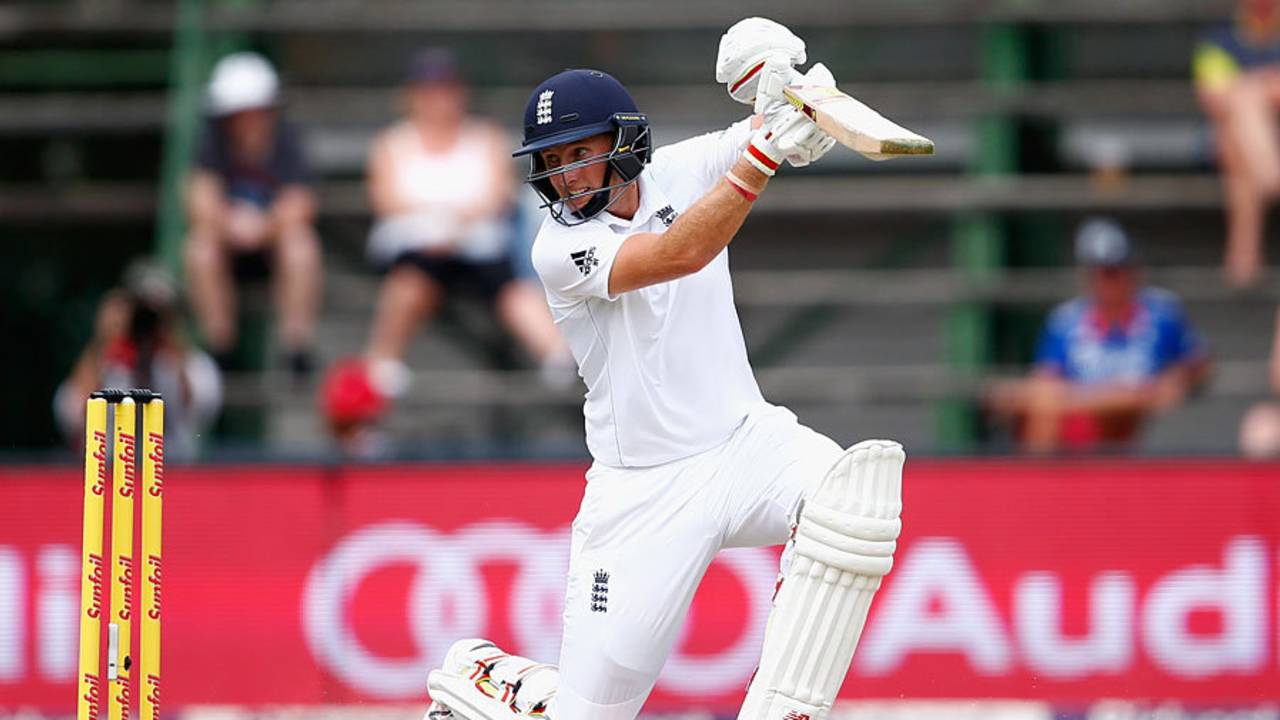Five of Root's best
England's Player of the Year was stellar in all formats in 2015-16
Andrew McGlashan
16-May-2016
Joe Root drives during his Johannesburg century • Getty Images
After Joe Root was named England's 2015-16 Player of the Year in all formats, we look back at five of his best innings - from the English summer to victory in South Africa and an incredible night in Mumbai.
98 v New Zealand, 1st Test, Lord's
It had only been a few weeks since a tumultuous turnover of England's management: Peter Moores sacked on a wet day in Dublin, shortly followed by Andrew Strauss, newly installed as director of cricket in place of Paul Downton, confirming the end of Kevin Pietersen's career while the new coach, Trevor Bayliss, would not even arrive for another couple of months. English cricket needed some good news. At 30 for 4 on the first morning, against a New Zealand side bristling under Brendon McCullum's leadership, it appeared a long way off. But out of the gloom emerged two talismen. Moments after Root had arrived, Ian Bell departed but the response was thrilling. Initially, Root allowed Ben Stokes to lead the charge but he soon joined in by attacking Mark Craig before lunch - by which time he had skipped to 48 off 45 balls. He was content to rein himself in again as Stokes sped away, but in the final session was within touching distance of another Lord's century until he edged Matt Henry two runs short. Still, he had helped ignite England's season. It was a theme that would continue.
104 v New Zealand, 1st ODI, Edgbaston
It was an inauspicious start to England's latest new era of one-day cricket when Jason Roy drove the first ball of the match to backward point but in a way that opening stroke only cemented the team's new conviction. There was no pulling back. Root's half-century came from 41 balls, his next fifty from just another 30 in a thrilling display of controlled striking; a hallmark of Root throughout his year was that he rarely needed to slog. He was out before the halfway mark of the innings - and Jos Buttler's 66-ball century would steal the headlines - but Root had ensured England's promises were anything but empty.
134 v Australia, 1st Test, Cardiff
The opening day of an Ashes series can be a fraught occasion; the build-up, the pomp and ceremony, then finally the cricket. It was Australia who started the stronger and Root, not for the first time, walked out at No. 5 with fewer than 50 on the board. His first two balls were dramatic enough: a thin inside edge saving him from lbw, then the moment when, edging a very full delivery from Mitchell Starc, Brad Haddin dropped the catch to his right. Root has since admitted he did not realise he had edged it. After that reprieve, though, he was dominant. By lunch he had chivvied the innings into life with five boundaries in his first 20 balls. Shortly after tea he went to his hundred off 118 balls with a pristine drive off Josh Hazlewood to the increasingly familiar cries around the ground of "Rooooot, Rooooot," which to the untrained ear could sound like boos. They were anything but, as Root continued to bring much cheer.

Joe Root's hundred at Cardiff set England on their way to regaining the Ashes•Getty Images
110 v South Africa, 3rd Test, Johannesburg
By now, Root was up to No. 4 following various batting reshuffles. He had started to get frustrated with himself, too, for not converting a host of half-centuries and other starts into three-figures. He put that right here. Coming in at 22 for 2 after 10 overs of exacting new-ball bowling from Kagiso Rabada and Morne Morkel, then a first-ball debut wicket for Hardus Viljoen, he immediately brought some proactivity to the innings. This was a spicy pitch and even without Dale Steyn, South Africa's 313 was looking significant. The score would become 91 for 4, but Root was into his groove. As at Lord's he then sat back a little to let Stokes unleash yet did not miss an opportunity to cash on some increasingly wayward offerings. He could not have brought up his hundred in better style, a rifled cover drive off Chris Morris, Test century No. 9. Although he could only add four more runs the next morning he had put England on course for parity. That allowed Stuart Broad to get to work.
83 v South Africa, World T20, Mumbai
Part-way through South Africa's innings, as they flayed England's attack, the cameras caught a shot of Root's face as he fielded on the boundary. He appeared filled with anger, or at the very least shock. Even on a flat pitch, few gave England a chance of chasing 230 to effectively keep their tournament alive. Root walked in during the third over, with 48 already on the board thanks to Roy and Alex Hales. The start was relatively sedate - 12 off 11 balls - then he deposited JP Duminy over deep midwicket and there was no looking back. He went on to produce an innings of such control and composure that, incredibly, it was possible to say that England had such a mammoth chase under control. What stood out was not so much his boundaries (the best of which was a dreamy lofted drive off Kyle Abbott) but his lack of dot balls. A deftness of touch and awareness of gaps meant he had just four scoreless deliveries - three against Rabada - in his 44-ball innings.
Andrew McGlashan is a deputy editor at ESPNcricinfo
